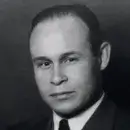
Charles R. Drew
Charles R. Drew was a surgeon and researcher in transfusions and blood plasma storage. He attended Amherst College (A.B., 1926), McGill University College of Medicine (M.D. and Master of Surgery degrees, 1933), and Columbia University College of Physicians and Surgeons (DMSc, 1940), the first African American to receive this degree. He did his internship and surgical residency at Montreal General Hospital and a surgery fellowship at New York’s Presbyterian Hospital.
In 1935, he joined the faculty at Howard University College of Medicine, starting as a pathology instructor, and progressing to surgical instructor and chief surgical resident at Freedmen’s Hospital, where he became Chief of Staff in 1944. At Howard, he raised standards in Black medical education. He also campaigned against the exclusion of Black physicians from local medical societies, medical specialty organizations, and the American Medical Association. In 1941, Drew became the first African American surgeon selected to serve as an examiner on the American Board of Surgery.
Appointed to direct the Blood for Britain project in September 1940, Drew instituted uniform procedures and standards for collecting blood and processing blood plasma at the participating hospitals. When the program ended in January 1941, Drew was appointed assistant director of a pilot program for a national blood banking system, jointly sponsored by the National Research Council and the American Red Cross. Among his innovations were mobile blood donation stations, later called bloodmobiles, that could collect blood and refrigerate it. Drew objected to the exclusion of African Americans’ blood from plasma-supply networks, and resigned in protest in 1942.